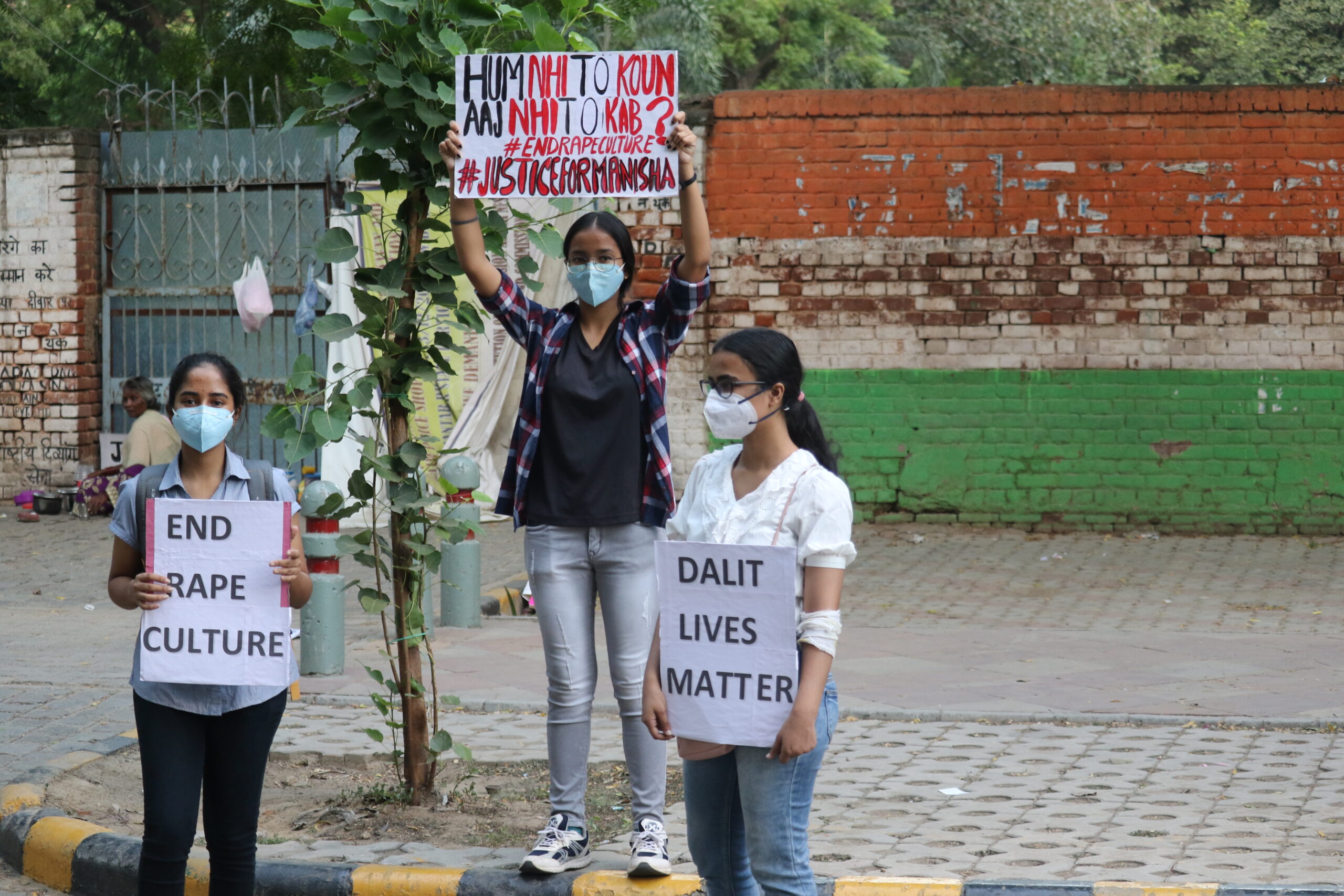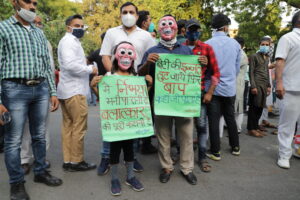Day for the Elimination of Violence against Women 2020: Indian women trapped by social norms

Dalit women have borne the brunt of violence with a spike reported in rapes and murders this year (MIG photos/Varsha Singh)
Ever since the nationwide lockdown was imposed in India in late March, a 27-year-old professional from Kolkata began to have recurring, bizarre nightmares. Often she would dream of being imprisoned alone in a dark space where someone would try to touch her very inappropriately and that the person was trying to choke her. Troubled by the persistence of the same kind of nightmares and the increasing frequency, at last the young woman reached out to Praneet Kaur, a counselling psychologist based in New Delhi.
Over the course of several sessions, the two were able to unravel dirty and dark truth behind the frightful nightmares. “Finally, we realised that she had been abused for a very long time by her own father, who was very distant and always away for work and the girl met her father for the first time only when she was three and she could not recognise him. He stayed for a couple of months and went away again. In her mind, she refused to acknowledge him as her father as whenever he would come back he would sexually violate her. Due to repeated cases of abuse, her brain suffered from traumatic amnesia and that meant that it had completely blacked out this part of her life and these traumatic experiences. But they would keep coming back through nightmares or certain kinds of clothes or smells or even set up in any room. Years of sustained sexual abuse by her own father is what she was suffering from and her mind had suppressed this totally. It came back to her now as she was listening to lot of similar conversations online. She had no idea what her past had been, but has realised now after she sought help,” Kaur tells Media India Group.
Suffering in silence
Despite her traumatic past, the Kolkata professional at least had the means to seek and obtain help. For a vast majority of women in India, notably those from weaker sections of the society – both socially and economically, getting any kind of help or assistance, let alone specialised and professional psychological assistance is way beyond their reach. And hence an overwhelming majority of cases still go unreported and unresolved and millions of women continue to suffer in silence.
Rani Patel, founder of Aarohan, a New Delhi-based NGO specialised in working with women and children, recounts the experience of one such woman, Geeta, a 35-year-old domestic maid working in south Delhi. “Her husband used to constantly beat her up and his violent methods increased during the lockdown as he would get drunk and start beating his wife mercilessly. Often, to get to his wife, he would also beat up the children. Once when he was drunk, he had come near our office and started to abuse and beat Geeta. When I saw that, I rushed out to save her and was carrying a small stick with which I began to beat him till he ran away,” recounts Patel.
Though Patel did manage to save Geeta from more violence that day, she says that the number of women suffering from violence in their everyday life is far too high for one organisation or an individual to be able to tackle. But in order to help, Aarohan has begun to sensitise the children that the organisation works with in order to at least be able to intervene and rescue the mother. “We have begun counselling the 500-odd children that come to Aarohan about violence and abuse and we have tried to educate them about the seriousness of the problem. We encourage them to inform us if they see such violence at home so we can help in rescuing the woman in question,” says Patel.
No lockdown on domestic violence
Most NGOs working with women and children in India report that there has been a sharp spike in the cases of violence, especially domestic violence against women since the lockdown was imposed across India on March 25. Their statements are borne by the data recently released by the National Commission for Women (NCW) which says that domestic violence complaints have increased by 2.5 times since the nationwide lockdown began in India. NCW says that this year between March 25 and May 31, a total of 1,477 complaints of domestic violence were made by women. This 68-day period recorded more complaints than those received between March and May in the previous 10 years.
NCW also said that as many as 86 pc of women who experience domestic violence do not seek help in India. Even though it shows a significant increase in the number of incidents, the NCW data does not capture the entire picture as all the complaints listed by NCW had been received via email. Thus, it excludes women from the lower strata of the population who are most vulnerable and either are illiterate or do not have access to email.
The United Nations says that violence against women and girls is one of the most widespread, persistent and devastating human rights violations in our world today, which remains largely unreported due to the impunity, silence, stigma and shame surrounding it. Another report, Gender Violence in India 2020, released this week, says that five Indian states — Haryana, Madhya Pradesh, Maharashtra, Rajasthan and Uttar Pradesh — have reported the bulk of the crimes committed against women in the country in 2019. The report by Prajnya Trust provided insights into gender-related crimes across the country, including the effect of the Covid-19 pandemic on gender violence.
Girish Kulkarni, founder of Snehalaya, an NGO based in Ahmednagar in the western state of Maharashtra says that the women’s helpline run by Snehalaya has reported a sharp jump in the number of cases of all kinds of violence and abuse of women, be it domestic violence, sexual abuse, child trafficking or child marriages.
Organisations like Snehalaya are trying to help such people through their Snehadhar Helpline that is especially run for women in distress. The reporting of cases has risen as earlier many women were unable to leave their homes due to difficulties in moving about during the lockdown. However, now that public transport has resumed and people are moving out of their homes, the reporting of these cases has gone up, says Kulkarni. He adds that Snehalaya is holding a week-long cycle rally across Ahmednagar district in December to create awareness about violence and other issues impacting women and girl children.
Kulkarni says that awareness has increased amongst women. “Due to information explosion over the past few years, notably during the lockdown, the awareness levels have definitely improved as women are hearing about and reading about many more such cases and their rights and now people have access to helpline numbers,” he tells Media India Group.
Praneet Kaur says that higher awareness levels have seen a flood of cases come to her since the pandemic began. “As there has been a lot of talk about mental health issues this year and also as people have had a lot more time on their plate and life has slowed down due to the pandemic and all these problems that we had managed to suppress for so long are coming back to the surface,’’ says Kaur, adding that with more women coming forth, her workload has more than doubled since the pandemic began. “I have never been so busy before. I have had to add more working hours and yet I am unable to cater to all the demand for help that I have received and as a result I am fully booked for the next five months,” she says.

Police inaction in numerous cases of crimes against women has forced people to hit the streets for justice (MIG photos/Aman Kanojiya)
The missing government
Despite the rising awareness, a vast majority of women are unable to access any form of help. Most NGOs blame the government for failing to rise to the challenge and say that the situation has deteriorated sharply since the lockdown began due to multiple reasons.
At a recent meeting convened by Niti Aayog, the policy making think tank of the Indian government, over two dozen NGOs from across the nation blamed the government for not providing adequate funding for them to be able to carry on with their activities. “Most of the government policies and infrastructure that have been set up to help the women exist only on paper. In the practical world, none of them work, leaving the problem at the doorsteps of us NGOs,” says a source.
The NGOs themselves have been struggling to survive since the outbreak of the pandemic. “This year, a large number of NGOs have been forced to either severely curtail their activities or shut down totally due to unprecedented financial constraints. This has put the onus on the government to step up and reach out to women. But so far I don’t see that happening,” warns Kulkarni.









